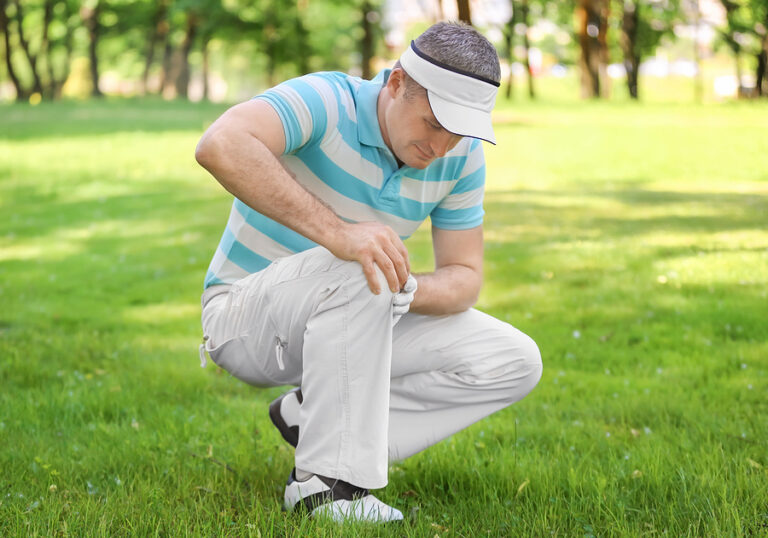
Knee pain is the second most common injury location in golfers after the low back. As with any injury the mechanism by which it happens is variable from person to person. If you have knee pain from a prior injury, it will substantially affect your swing by excessively putting demands on other joints for what the knee can not handle. If you hurt your knee during golf, it is usually an injury due to repetition.
During a golf swing, a player will both rotate and laterally bend to strike the ball. Ideal biomechanics would allow the rotation and lateral movements to be generated from the hips, low-back and mid-back. Stability from the core would prevent excessive movement from any one joint complex. When these ranges of motion are disturbed, either by tight muscles, pain or weakness golfers will often transfer the movement to their knees. Introducing rotation and lateral bending to the knee are 2 movements the knee is not able to handle. The knee is a hinge joint which should be mainly for flexion and extension. Repetitive stress which is outside of the normal movement of the knee is what leads to injury.
Some common injuries to the knees of golfers include (in no particular order):
- Meniscus injury: twisting your knee while it is bearing weight is the mechanism for many meniscus injuries across all sports, with golf being no exception. The medial meniscus is more prone to injury due to attachments to the medial collateral ligament. Tears can often be felt as a “catch” during motion.
- Sprain/Strain: Injury to muscles and tendons can occur from overuse as well as abnormal biomechanics. These may result from a sudden change of activity level or insufficient rest between sessions.
- Patellar tracking: The movement of the patella up and down can be disturbed by muscle imbalances. This causes the patella to be pulled to a side while it is moving up or down and can create inflammation and pain as it rubs against the tissues below it.
- Osteoarthritis: Wear and tear on the bones of the knee can result in arthritic changes to those bones which can later range of motion, cause pain, and make the joint more prone to future injury.
Pain should be addressed prior to golfing or at the immediate onset of knee pain. Waiting too long to address an injury can lead to other more severe conditions. More importantly, playing with pain will alter your golf mechanics and decrease your ability to perform to your full potential.
If you are suffering from knee pain and looking to get back into golf or have injured your knee while golfing you should schedule an appointment. We are experts in diagnosing and treating knee conditions. If you have a golfing injury or want to prevent an injury affecting your game, contact us today and we will get you started on a comprehensive rehabilitation and strengthening program.
Every patient and athlete is different, which is why we take an individualized approach to each person. We specialize in therapies that will correct issues that golfers chronically suffer from. We can help reduce your symptoms and improve your game!
To schedule an appointment please call the office at (815)-717-6483, or schedule online at your convenience. For future updates, hours, and news about MVP Chiropractic follow us on facebook!
http://65c.a2e.myftpupload.com/schedule-now/
Written by Dr. Kyle Bastean
Edited by Dr. Michael Veerman

